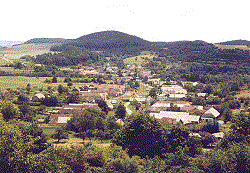The earliest historical reference for Kráľovce - Krnišov dates from 1266 which means
that the village is a typical example of one of the oldest villages in the region.
The village is situated in the micro region of Južné Sitno and spreads over the
protected area of Štiavnické vrchy. The easiest way to approach this village is by the
road No. 525 which starts in the town of Banská Štiavnica, goes through valley of
Štiavnica river and joins the crossroads at Hontianske Nemce. From this crossroad, the
roads then continue to Zvolen (via Krupina), second to the spa town of Dudince and
continuing further to Hungary and the third to the western side of Slovakia (via Levice).

|
|
the view on the village
|
Points of interest, remarkables and rarities

Flora, fauna and leisure activities in Kráľovce - Krnišov
- Local forests and woods are full of oak, beech and horn-beam trees
- A 400 year old oak tree (height - 25 m, girth - 630 cm, the longest branch -
14 m, volume - 403 m3) and 200 years old linden tree
- Several varieties of mushrooms such as boletus and chanterelle
- Hunting trips available
- Private horse riding farm centre
- Footpaths for walkers (suitable during summer season)
- Tradition of local viticulture - the village has always grown grapes and
produced local wine. Special wine cellars under wine houses were used for grape
storage.
Local architecture and traditions
- Despite of the modern development in the village, there are still some examples
of the local architecture such as houses with wooden roofs, typical gables and hand
made carpets, stone columns supporting gates, ornamental sculptures, stone window
frames and traditional churchyard stones, hand crafted gates and metal ornaments on
windows. There is also a village well containing high quality water, which is still
used in the households.
- The neo gothic church dates from 1794 and was rebuilt in 1911.
- The bell house
- Local delicatessen and specialties: egg mash called "baba", small sweet pasties
and strudels filled with jam, poppy seeds, sweet cheese or crushed nuts.
Famous locals and natives
- Andrej Kmeť - archaeologist, botanist and ethnographer who lived in the
village between 1873 and 1878
- Jozef Luňáček - naturalist who lived in the village between 1844 and 1911
- Prof. Samuel Stankoviansky - scientist in the area of analytical chemistry
who cooperated with prof. Hezrovský who was the recipient of a Nobel award.
Translation: Bendíková
|